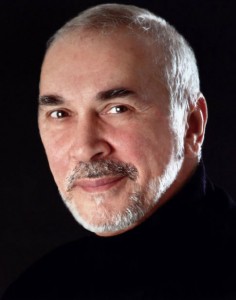“Five decades in my profession has afforded me the transient company of many remarkable people. . . . Like elusive fireflies, they flickered for a time, shone brightly, dimmed, and ultimately disappeared.” —from the author’s preface
Actor and first-time book author Frank Langella has an excellent anecdote and linchpin upon which to base an entire memoir, Dropped Names. It’s about the famous celebrities he has known during five decades in his profession, men and women, mostly Hollywoodites and all either long or recently dead.
As he relates in his preface, Langella was part of a dinner gathering of actors, young and old, when someone remarked, “ ‘Oh, I’ll never forget when the Queen Mother turned to me and said . . . ’ I couldn’t resist. I picked up a piece of silverware and sent it clattering loudly to the floor. ‘Oops! I dropped something!’ I declared. And a ritual was born. Like a pack of wolves let loose on a defenseless critic, the gathered predators got the joke and began to drop names and toss silverware in a frenzy of competitive hilarity.”
“Pack of wolves” and “predators” and other thespian negatives Langella uses in his first page—“actors are each other’s best audience,” “the animals” and “bloodlust”—might suggest he doesn’t particularly like his fellow movie types. A reading of his book may confirm that hypnosis, so negative, so harsh on people, is he at times. Or maybe not. All too eager to criticize, he is equally prepared, where he feels it’s due, to praise or extend gratitude.
The book is fascinating enough in its way and an easy read, so much so that I covered the 356 pages, with only minor interruptions, in two days. Langella writes darn well and uses effectively, even vividly sometimes, allusions, metaphors, alliteration and other tools of the writer’s craft. He closes many chapters with eloquence and a poet’s sense of rounding off. He has a sympathetic touch for relating bedside scenes of the dying, of which there are several, and conveying the horrid progress of a star’s deterioration, whether from disease or drink.
But these reminisces—he takes his subjects in the chronology of their deaths—weren’t what I had expected. So urbane, commanding in presence and intelligent sounding on the talk shows where he has pushed his memoir, Langella comes across in print as a gossipy old woman, regaling his reader with his friends’ and antagonists’ sordid sexual and drinking exploits, sometimes more with envy than with disapproval. Not that he hasn’t acquired his own kudos in these areas, as he suggests more than once.
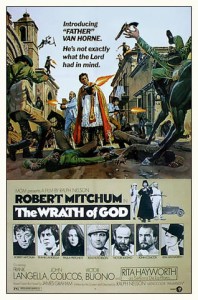 The few references to his films and plays are only incidental to his stories—both his first Western and Rita Hayworth’s last film (The Wrath of God), his production of Arthur Miller’s After the Fall, his part as Salieri in Amadeus at the Broadhurst Theatre in New York and the death of Oliver Reed during the filming of Cutthroat Island—“perhaps the single worst disaster in which I have ever appeared.” A most versatile actor, Langella has starred in such films as Dracula, Frost/Nixon and Good Night, and Good Luck.
The few references to his films and plays are only incidental to his stories—both his first Western and Rita Hayworth’s last film (The Wrath of God), his production of Arthur Miller’s After the Fall, his part as Salieri in Amadeus at the Broadhurst Theatre in New York and the death of Oliver Reed during the filming of Cutthroat Island—“perhaps the single worst disaster in which I have ever appeared.” A most versatile actor, Langella has starred in such films as Dracula, Frost/Nixon and Good Night, and Good Luck.
His flirtation with Hollywood began as a boy of fifteen in 1953, meeting quite serendipitously Marilyn Monroe, who whispered a soft “Hi” as she glided from a black limousine and crossed the sidewalk in front of him to the steps of a building. “Had I turned the corner sixty seconds later or had her car caught a light and been delayed it would not have happened. She was my first. . . . One [word] was enough. Lightning had struck.”
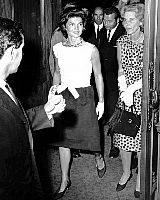 Two chapters, or individuals, later Langella spends four hours with the Kennedys—JFK and Jackie—and their friends, Noel Coward, Adele Astaire and Paul and Rachel “Bunny” Mellon. (As of this writing, “Bunny” has appeared at the John Edwards trial—something about a bounced check and a “furniture business.”) That Kennedy luncheon in 1961 had the informality, the fun and frolic, of screen time with Monty Woolley and Ann Sheridan in The Man Who Came to Dinner.
Two chapters, or individuals, later Langella spends four hours with the Kennedys—JFK and Jackie—and their friends, Noel Coward, Adele Astaire and Paul and Rachel “Bunny” Mellon. (As of this writing, “Bunny” has appeared at the John Edwards trial—something about a bounced check and a “furniture business.”) That Kennedy luncheon in 1961 had the informality, the fun and frolic, of screen time with Monty Woolley and Ann Sheridan in The Man Who Came to Dinner.
Before his parade of celebrities ends, Langella has reminisced about, on the one hand, the people he obviously liked and appreciated and, on the other, those whose presence he wished to avoid. In the first category, Rex Harrison was his idol, “the most accomplished, technically perfect, and totally believable English actor of his time.” He found director Roger Vadim’s “devotion to physical pleasure honest and exciting,” and something of a personal aspiration. Under the same heading of devotion and admiration were Raul Julia, Alan Bates, Al Hirschfeld, Jill Clayburgh, Robert Mitchum and a number of others.
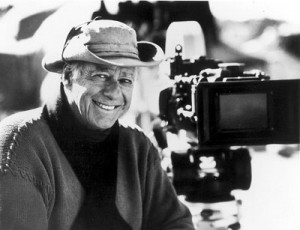 In the heartily dislike column? Usually men. A foul-mouthed John Frankenheimer who chewed Langella out over the telephone for dropping out of one of his pictures. Lee Strasberg who “stood tallest on the list of the arrogant and insufferable, . . . a cruel and rather ridiculous demigod who ran a highly profitable racket.” Elia Kazan who was all about control and getting hold of people’s minds. And then Anthony Quinn, whose “aura was so sour and his sense of entitlement so pervasive that I was helpless to conquer my distaste for him.”
In the heartily dislike column? Usually men. A foul-mouthed John Frankenheimer who chewed Langella out over the telephone for dropping out of one of his pictures. Lee Strasberg who “stood tallest on the list of the arrogant and insufferable, . . . a cruel and rather ridiculous demigod who ran a highly profitable racket.” Elia Kazan who was all about control and getting hold of people’s minds. And then Anthony Quinn, whose “aura was so sour and his sense of entitlement so pervasive that I was helpless to conquer my distaste for him.”
Some of Langella’s less favorites he didn’t particularly dislike; he just found them empty, or, perhaps more accurately, simply not sharers of his interests. His take on two actors in particular is quite different from the presumed images of most celebrity watchers. Paul Newman: “After the dirty-sexy jokes, shop talk, cars, or politics were exhausted, Paul was a pretty dull companion. Never rude or unkind, just dull.” And Charlton Heston: “ . . . he possessed about as much sex appeal as a railroad tie and was about as humorless as a CAT scan. Chuck’s accomplishments as a great movie star cannot be dismissed, of course. But . . . he was under the impression he was also a great actor.”
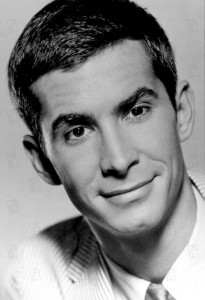 Sex in general is a favorite subject, and bisexuals and gays in particular are gleefully detailed, as if that’s all these individuals were about, with no other personal facets. Anthony Perkins: “Skittish, compulsively flirtatious, and often sexually charged, he seemed always to be flinching from an expected whack to the back of his head.” Laurence Olivier: Even though tempting him with a flash of the “naught bits,” Langella would still write, “There was a great deal about him I found charming, delightful, and admirable. But I was always keenly aware . . . that I was dealing with a deadly cobra capable of striking without notice.”
Sex in general is a favorite subject, and bisexuals and gays in particular are gleefully detailed, as if that’s all these individuals were about, with no other personal facets. Anthony Perkins: “Skittish, compulsively flirtatious, and often sexually charged, he seemed always to be flinching from an expected whack to the back of his head.” Laurence Olivier: Even though tempting him with a flash of the “naught bits,” Langella would still write, “There was a great deal about him I found charming, delightful, and admirable. But I was always keenly aware . . . that I was dealing with a deadly cobra capable of striking without notice.”
There were other actors who were just as fervently heterosexual. Gilbert Roland: “He was so matter-of-fact and businesslike about it that I began to laugh hysterically as he described sex acts the way one man might tell another the order in which to oil, polish, lube, and wash his car.” Yul Brynner: “Never far from a full-length mirror, he maintained his aura assiduously. . . . He still looked incredibly handsome, and was at that point in his life doomed to continuously play the one major chord [The King and I] in his minor arsenal.”
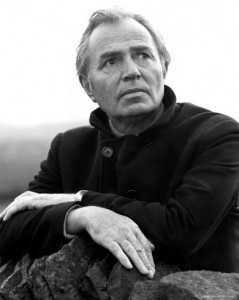 Many of the people Langella profiles come across as victims of Hollywood. James Mason, despite “possibly the most beautiful speaking voice I have ever heard, then or now,” had a “melancholy sadness” and “a fatigue of the spirit.” Susannah York’s own sadness was already evident in her early sixties—“ . . . her hair unkempt and grayish, she was instantly heartbreaking. The same lost-lamb expression was still there. But gone the voluptuous beauty . . . ”
Many of the people Langella profiles come across as victims of Hollywood. James Mason, despite “possibly the most beautiful speaking voice I have ever heard, then or now,” had a “melancholy sadness” and “a fatigue of the spirit.” Susannah York’s own sadness was already evident in her early sixties—“ . . . her hair unkempt and grayish, she was instantly heartbreaking. The same lost-lamb expression was still there. But gone the voluptuous beauty . . . ”
Richard Burton, as Langella reminds his readers, never won an Oscar. “[His] inevitable descent began in earnest with his meeting and marrying Elizabeth [Taylor]. The Welsh boy had climbed to the top of a ladder on rungs covered with money, fame, sex, booze, and all the other slippery slop of our profession. He clearly loved it all, and it was tragic to watch him slide slowly down and eventually disintegrate.” A dark, negative bit on a life—but, yes, vividly described by the observer.
In a hard-to-believe tale, Langella tells about the “narcissistic” and “demanding” Anne Bancroft. While at a perfume counter in Bloomingdale’s, Bancroft was so fascinated by a woman she saw across the way that she wanted to go over and embrace her and kiss her, until she realized she was looking into a mirror. A few weeks after her memorial service, at which the author spoke, Langella asked her husband Mel Brooks how he was doing. “Still trying to please Annie,” he replied without a laugh.
 Langella, who admits to being in therapy and being “saved” by it, points to one alcoholic actor whom he nevertheless calls “a genius,” who severely needed that service—George C. Scott. “There was a quality in George so desperate for a comfort you felt you could not provide, that it inhibited you from making any effort.” Scott, the author says, disdained therapy as a crutch, not realizing that the liquor glass in his hand was his own crutch.
Langella, who admits to being in therapy and being “saved” by it, points to one alcoholic actor whom he nevertheless calls “a genius,” who severely needed that service—George C. Scott. “There was a quality in George so desperate for a comfort you felt you could not provide, that it inhibited you from making any effort.” Scott, the author says, disdained therapy as a crutch, not realizing that the liquor glass in his hand was his own crutch.
Others—men and women, including Oliver Reed, Bette Davis, Arthur Miller, Dominick Dunne, Rita Hayworth, Raul Julia, Jo Van Fleet—had terrible, lonely declines or horrific deaths, or both.
Still others, more often women, seemed to emerge generally unscathed by the corrosion of their profession. Many of Langella’s friends persevered to the end, with dignity and true to themselves—Loretta Young, Billie Burke, Tip O’Neill, Jacqueline Kennedy, Dinah Shore, Jessica Tandy and Hume Cronyn, Al Hirschfeld, Maureen Stapleton, Deborah Kerr.
Even the Queen Mother. Yes, in 1972 Langella had an extended conversation with her. “The Queen Mum was a jolly camper, totally captivating, charming, and curious.” On a chance second encounter after an official queuing on Derby Day, he found the royal “alone” and graciously directed her back to her “family.” It’s extremely unlikely that the Queen Mother would have been anywhere “alone,” outside of a royal residence!
Speaking of which, anything in this memoir that might appear embroidered or fabricated has been qualified by Langella in his preface, that his memories “are most likely prejudiced, somewhat revisionist, and a tad exaggerated here and there.” So, reader, be warned: maybe his next book will be a novel.
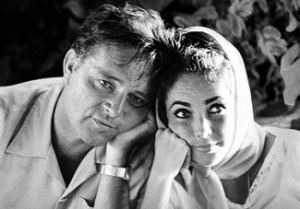 The time devoted to each celebrity varies. Most average three or four pages. Some, those devoted to Hayworth, Olivier, Julia, Miller and a few others, go well beyond that. Perhaps the most moving concerns writer and investigative journalist Dominick Dunne—his dying and his inability, in his last breaths, to reveal a personal secret to his son. The longest episode, at sixteen pages, is on Elizabeth Taylor. It’s conceivably the most relaxed, inviting read, perhaps because Langella obviously admired her, but as in dealing with other large egos, he was wary: “A small, sweet woman who wanted a man to . . . fill a void as deep as the deepest ocean. No man could possibly stay afloat in it.”
The time devoted to each celebrity varies. Most average three or four pages. Some, those devoted to Hayworth, Olivier, Julia, Miller and a few others, go well beyond that. Perhaps the most moving concerns writer and investigative journalist Dominick Dunne—his dying and his inability, in his last breaths, to reveal a personal secret to his son. The longest episode, at sixteen pages, is on Elizabeth Taylor. It’s conceivably the most relaxed, inviting read, perhaps because Langella obviously admired her, but as in dealing with other large egos, he was wary: “A small, sweet woman who wanted a man to . . . fill a void as deep as the deepest ocean. No man could possibly stay afloat in it.”
The one person in the book he did not know or meet was Princess Diana. “But her death touched my life on a day I will always remember.” By happenstance, the day of her funeral he was in London and watched the proceedings, first on TV, then “live” from a sidewalk as the hearse passed on its way to Althorp, Diana’s country home.
And talk about perseverance! In the final chapter, Langella returns to Rachel “Bunny” Mellon, wife of Paul Mellon, two Kennedy friends from that summer of 1961. The author admits to violating his own proviso for inclusion in Dropped Names, to be precise, that folks have to be dead. Still alive at this writing and turning 102 this August, “Bunny” gave Frank Langella some good advice back when he was twenty-four years old.
When he asked what he should do when meeting a famous person, she said, “Oh, Frank, don’t think too much about famous people. They already think too much about themselves.”
